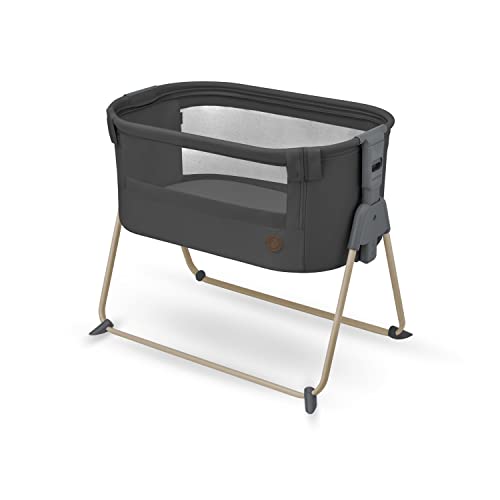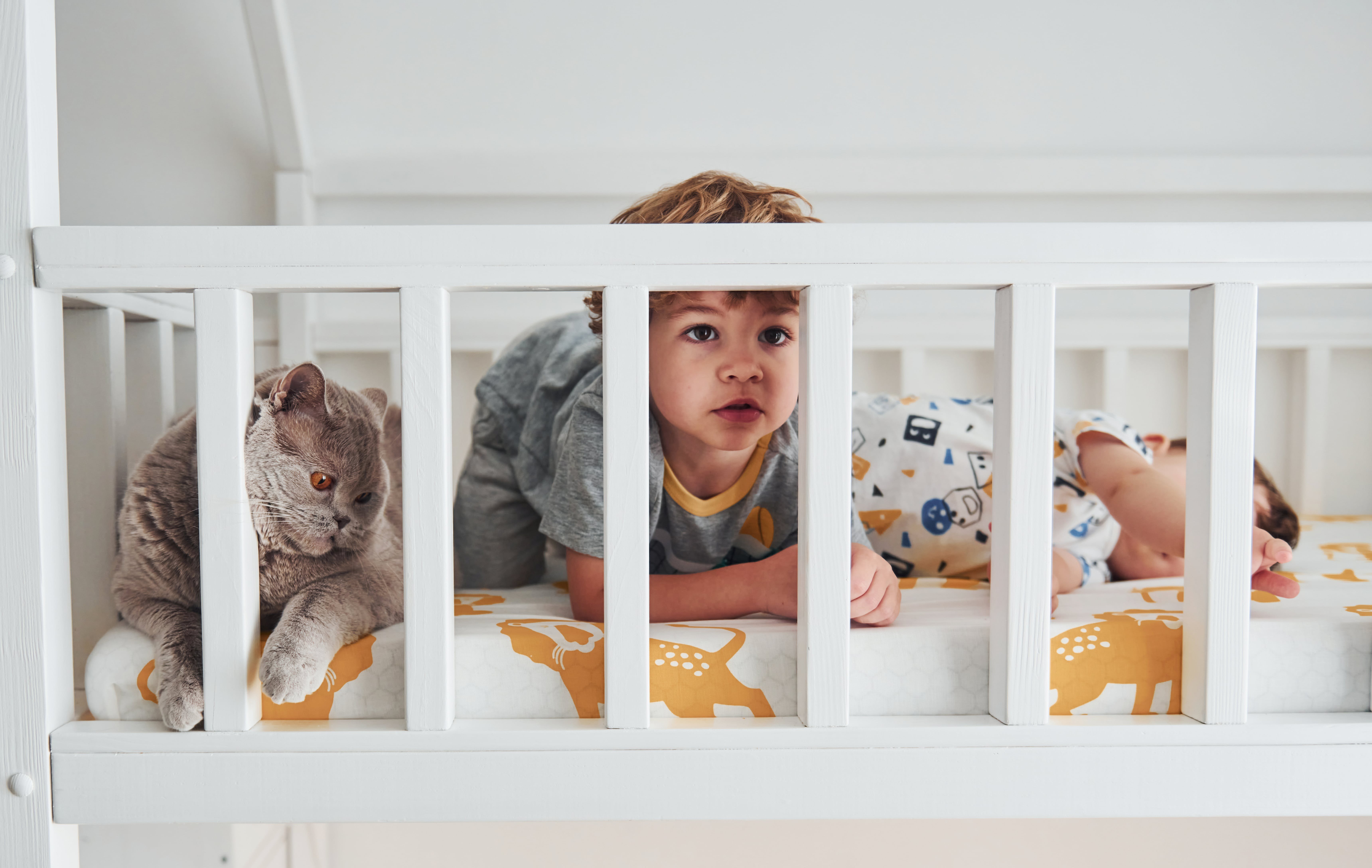The 9 Things Your Parents Teach You About Bedside Crib Vs Cot
Geneva Bain
0
4
01.07 20:32
 bedside crib vs cot (Look At This)
bedside crib vs cot (Look At This)A bedside crib (also known as co-sleeper) lets your baby sleep close to you during the night. It is important to follow the official safe sleeping guidance from the NHS and Lullaby Trust.
Our mum testers love the SnuzPod's breastfeeding-friendly drop side, 30-second open and fold mechanism and reflux incline function. It's also simple to move around due its slim frame.
Safety
Bedside cribs are an excellent alternative for families who co-sleep. However, NHS Safe Sleep advice suggests parents make sure that they have a separate sleeping area for their infant and avoid sharing a bed in order to minimize the risk of suffocation, overheating and rollovers.
When selecting a bedside crib it is essential to ensure that the crib conforms to European safety standards and adheres to Lullaby Trust codes for safe sleep, so that your child is sleeping in a safe and secure environment. bedside crib to cot cribs that have adjustable height settings can be matched to the parent's bed frame to reduce the risk of infants being trapped in gaps. The cribs come with an even, firm mattress that is designed to promote healthy sleep habits.
Most bedside cots for newborns cribs feature the option of a panel that can be raised to allow you to safely monitor your baby during the night. This means that you can comfortably provide them with food, comfort them and monitor them without having to get out of bed, which is particularly beneficial for mothers recovering from c-section births, or those who have limited mobility. Some models, such as the SnuzPod4, offer a reflux incline feature for babies who have reflux or digestive issues.
A lowered panel will also reduce the risk of your baby falling over the edge of the bed. A lot of these panels have mesh sides that stop duvets and pillows from falling into the crib. This is crucial for reducing the risk of SIDS because babies who fall off their backs are at greater risk of suffocation.
It is advised to keep any soft or dummy toys from the crib as they could be suffocation hazards. A crib mattress that is breathable and regular checks for gaps or loose bedding are also essential to ensure your baby is secure. Once your baby can stand or sit (typically at about 6 months) they will require a travel cot bedside, or another sleeping arrangement that is suitable for. If you are concerned about this transition, speak to your GP or a health professional.
Comfort
The best cribs for bedside offer an environment that is safe and comfortable for your baby to rest. They are designed to be placed next to your bed, they will allow you to take care of your baby without getting out of bed. They also allow you to bond with your infant during those crucial early months. This feeling of security can help to establish positive nighttime routines and improve the overall quality of your baby's sleep.
You should keep your child in a crib beside the bed until they reach 6 months old or are able to stand independently. At that point, you should change them to an older cot. The bedside crib is likely to be suitable for your child until they reach the age of 6 months, but it's crucial to review the specific guidelines for the product.
When selecting a bedside crib make sure it is in compliance with EN 1130 safety standards. It must be able to work with your current bed (most are attached to traditional bed frames, however it is important to double-check the exact dimensions). It is crucial that the mattress of your bedside cots crib is flat, firm and airy. This is essential for your baby's health.
Our mum testers who are experts have been talking about the Chicco Next2me Side Sleeping Crib, which features a height-adjustable base that can be used as a stand-alone crib or affixed to your bed. The crib is light and easy to assemble. It also provides great value for the money. Silvercross Voyager is another of our top picks. Our test subjects love it for its versatility, comfortable mattresses and the reflux incline feature.
Space
A bedside crib is an attachment that clips onto the side of the bed. This allows you to keep your child close all night long without the risk of co-sleeping, which isn't recommended by the NHS or The Lullaby Trust. They've grown in popularity recently with mums looking for a way to bond with their newborn while remaining safe.
Some have a lowering panel that you can use for secure viewing and touch of your baby. Others allow you to keep the panel closed at night, allowing you to feed and monitor your child without anxiety. Some come with an incline function for reflux too, which most of our test mothers appreciated for aiding digestion and reducing discomfort for those children suffering from reflux or wind.
Many bedside cribs have adjustable height settings which allows you to place them at the same height as your mattress, so there's no gap that could allow baby to climb up or slide out. This is an important benefit for those recovering from C-sections since it can be a challenge to get in and out of bed as your body heals.
The lowered sides also offer some privacy, which makes them ideal for new parents who are worried about sharing a room with their infant. It is important to keep in mind that even if you decide to sleep with your baby in a crib, or cot near your bed, it's important to follow the official guidelines for safe sleeping and avoid sharing your bed.
Before you purchase, you'll need to check whether your crib for bedside will fit your bed frame. Some cribs can be clipped onto bedsteads, while others are more suitable for divan beds. Don't forget to buy an appropriate mattress for your crib. These are usually sold separately from the crib and should be in line with the most recent BS EN1130:2019 safety standards.
Some cribs that are bedside can be converted into toddler beds, which can add to the life of parents who don't want to buy an additional cot for their older child. The SnuzPod4 is an example, with a slim, sleek frame that can be easily tucked into the corner of your bedroom and offers plenty of space for your baby to rest comfortably. It's also simple to put together, and comes with a handy bag for traveling.
Convenience
A bedside crib allows you to easily lift your child out of bed to feed them, cuddle them and soothe them back to sleep. A majority of cribs have a side panel that can be lowered down, so you can be able to touch and talk with your baby without having to wake them completely or disrupt their sleep. Some cribs keep the side panel in place all the time. This is perfect for parents who have had C-sections who want to keep their baby close.
Some cribs offer a tilt option, which can aid in reducing colic and reflux. It is important to note that the tilting of the crib should only be done by parents who know their baby's medical requirements and the history.
Another thing to think about is how easy the crib is to clean, and if it's machine washable or will you have to wash it by hand it manually. Some cribs have waterproof covers that guard against leaky diapers, infant sickness and dribbles. Some cribs are equipped with an organizer bag, which makes them perfect for traveling in case you need to take your baby along.
It's also important to take into consideration how heavy the crib will be and whether it is easy to move from one room to another. Our 2021 Mother & baby bedside crib awards mum tester Jasmine has described the Red Kite Cozysleep beside crib as "just the right size and lightweight enough to be able to move around your house. It folds flat, and comes with a bag to take on trips to the grandparents.
 We suggest that you look through our reviews and ratings to ensure that you select the right crib for you and your baby. Be aware that even though a crib might look lovely and stylish, it's crucial to remember that your newborn will quickly outgrow its small size. Therefore, you'll have to move your baby into a crib bed before they begin to grow out of it.
We suggest that you look through our reviews and ratings to ensure that you select the right crib for you and your baby. Be aware that even though a crib might look lovely and stylish, it's crucial to remember that your newborn will quickly outgrow its small size. Therefore, you'll have to move your baby into a crib bed before they begin to grow out of it. 








